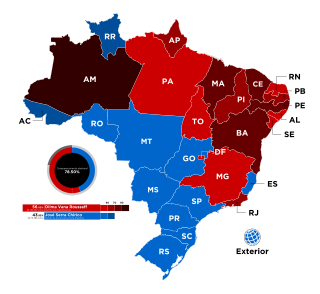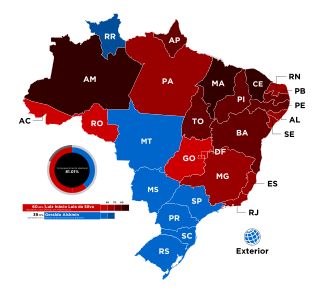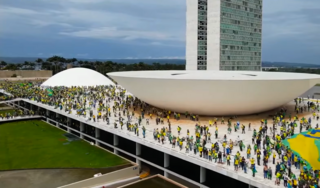
2018 (MMXVIII) was a common year starting on Monday of the Gregorian calendar, the 2018th year of the Common Era (CE) and Anno Domini (AD) designations, the 18th year of the 3rd millennium and the 21st century, and the 9th year of the 2010s decade.

2022 (MMXXII) was a common year starting on Saturday of the Gregorian calendar, the 2022nd year of the Common Era (CE) and Anno Domini (AD) designations, the 22nd year of the 3rd millennium and the 21st century, and the 3rd year of the 2020s decade.
2023 (MMXXIII) is the current year, and is a common year starting on Sunday of the Gregorian calendar, the 2023rd year of the Common Era (CE) and Anno Domini (AD) designations, the 23rd year of the 3rd millennium and the 21st century, and the 4th year of the 2020s decade.

Luiz Inácio Lula da Silva, known as Lula, is a Brazilian politician who is the 39th and current president of Brazil. A member of the Workers' Party, he previously served as the 35th president of Brazil from 2003 to 2010.

Jens Stoltenberg is a Norwegian politician who has been serving as the 13th Secretary General of NATO since 2014. A member of the Norwegian Labour Party, he previously served as the 34th Prime Minister of Norway from 2000 to 2001, and again from 2005 until 2013.

Geraldo José Rodrigues Alckmin Filho is a Brazilian politician who has served as the 26th vice president of Brazil since 1 January 2023. He previously served as the Governor of São Paulo from 2001 to 2006, and then again from 2011 to 2018, the longest term served in that state since the end of the Military dictatorship in Brazil. He was the Brazilian Social Democracy Party (PSDB) presidential nominee for the 2018 Brazilian presidential election, when he finished in fourth place, as well for the 2006 Brazilian presidential election, when he came in second place, losing in the runoff to then president Luiz Inácio Lula da Silva.

Brazilian history from 1985 to the present, also known as the Sixth Brazilian Republic or New Republic, is the contemporary epoch in the history of Brazil, beginning when civilian government was restored after a 21-year-long military dictatorship established after the 1964 coup d'état. The negotiated transition to democracy reached its climax with the indirect election of Tancredo Neves by Congress. Neves belonged to Brazilian Democratic Movement Party, an opposition party that had always opposed the military regime. He was the first civilian president to be elected since 1964.

The Liberal Party is a conservative liberal political party in Brazil. From its foundation in 2006 until 2019, it was called the Party of the Republic.

General elections were held in Brazil on 3 October 2010 to elect the president, National Congress and state governors. As no presidential candidate received more than 50% in the first round of voting, a second round was held on 31 October to choose a successor to Luiz Inácio Lula da Silva of the Workers' Party (PT), who was constitutionally ineligible to run for a third term as he has already served two terms after winning the elections in 2002 and being re-elected in 2006.

Fernando Haddad is a Brazilian academic and politician who has served as the Brazilian Minister of Finance since 1 January 2023. He was previously the Mayor of São Paulo from 2013 to 2016 and the Brazilian Minister of Education from 2005 to 2012. He was the Workers' Party candidate for President of Brazil in the 2018 election, replacing former President Luiz Inácio Lula da Silva, whose candidacy was barred by the Superior Electoral Court under the Clean Slate law. Haddad faced Jair Bolsonaro in the run-off of the election, and lost the election with 44.87% of the votes against Bolsonaro's 55.13%.

General elections were held in Brazil on 1 October 2006 to elect the president, National Congress and state governors, with a second round of the presidential election on 29 October as no candidate received more than 50% of the vote in the first round.

General elections were held in Brazil on 7 October 2018 to elect the president, National Congress and state governors. As no candidate in the presidential election received more than 50% of the vote in the first round, a runoff round was held on 28 October.

General elections were held in Brazil on 2 October 2022 to elect the president, vice president, the National Congress, the governors, vice governors, and legislative assemblies of all federative units, and the district council of Fernando de Noronha. As no candidate for president—or for governor in some states—received more than half of the valid votes in the first round, a runoff election for these offices was held on 30 October. Luiz Inácio Lula da Silva received the majority of the votes in the second round and became president-elect of Brazil.

Brazil–Venezuela relations refers to the diplomatic relations between the bordering countries of Brazil and Venezuela.

The second presidency of Luiz Inácio Lula da Silva started on 1 January 2023, when he was inaugurated as the 39th President of Brazil. Lula was elected for a third term as President of Brazil on 30 October 2022, by obtaining 50.9% of the valid votes in the 2022 Brazilian general election, defeating incumbent Jair Bolsonaro.

Luiz Inácio Lula da Silva and Geraldo Alckmin were inaugurated as 39th President of Brazil and 26th Vice President of Brazil, respectively, on 1 January 2023, in a ceremony held in the National Congress in Brasília, beginning the third Lula administration. At the age of 77, Lula became the oldest president-elect to assume office and the only president in Brazilian history to serve two non-consecutive terms in office through the democratic vote.
Individuals and events related to 2023 in Turkey.

Events in the year 2023 in Brazil.
General elections will be held in Brazil on 4 October 2026 to elect the president, vice president, members of the National Congress, the governors, vice governors, and legislative assemblies of all federative units, and the district council of Fernando de Noronha. If no candidate for president—or for governor in some states—received more than half of the valid votes in the first round, a runoff election for these offices will be held on 31 October.

On 8 January 2023, following the defeat of then-president Jair Bolsonaro in the 2022 Brazilian general election, a mob of his supporters attacked Brazil's federal government buildings in the capital, Brasília. The mob invaded and vandalized the Supreme Federal Court, the National Congress building and the Planalto Presidential Palace in the Three Powers Plaza, seeking to violently overthrow the democratically elected president of Brazil Luiz Inácio Lula da Silva (Lula), who had been inaugurated on 1 January. Many rioters said their purpose was to spur military leaders to launch a coup d'état and disrupt the democratic transition of power. Neither Lula nor Bolsonaro were in Brasília at the time of the attack.















